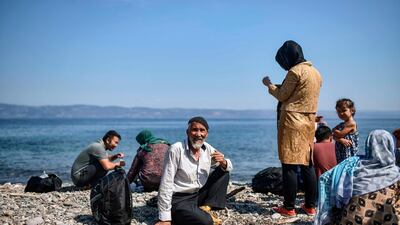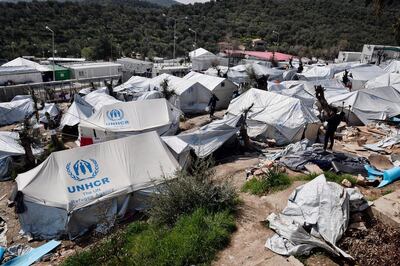Greek authorities have arrested three volunteers and implicated dozens of others working with a migrant rescue organisation on the island of Lesbos alleging they ran a criminal network and aided smugglers, claims those implicated have denied.
Authorities have accused over 30 past and current volunteers belonging to Emergency Response Centre International (ERCI) and other organisations on the island of involvement in a criminal network. They are also accused of coordinating with smugglers on the illegal entry of foreign nationals to Greece as well as conducting espionage and misuse of donations to a registered charity.
"The activities of an organised criminal network that systematically facilitated the illegal entry of foreigners were fully exposed," a police statement said.
Two long-term volunteers with ERCI have been held in pre-trial detention since August 23. A third handed himself in to authorities on Tuesday and awaits questioning, a former volunteer who is close to the case told The National on condition of anonymity as he's not authorities to brief the media. ERCI has not yet made a public statement about the arrests.
One of the two being held by police is Sarah Mardini, a 23-year-old Syrian refugee student and scholarship recipient of Bard College in Berlin. She has been moved to Athens where she is being held until trial.
Her sister, Yusra, competed as part of the refugee team at the Rio 2016 Olympics and is a UNHCR goodwill ambassador.
A year earlier, the sisters were celebrated after using their swimming skills to pull the water-logged boat that brought them over from Turkey with another 18 people on board. They had both at times been involved with the organisation on Lesbos.

The second volunteer in detention is Sean Binder, a 24-year-old German national, while the man in custody is a Greek national who was previously the field director of ERCI.
"Sean is now detained for over a week and is very hard to understand why this is happening", his mother Fanny Binder said. "I brought my son up in the belief that we can change the world to a better place when we help and do good work. Now I feel like a lier!"
She added that both Mr Binder's father and stepfather had been refugees, adding to his motivation to help those arriving in Lesbos.
"He only wanted to help and he loves that work, why does he have to go to prison?"
Yusra's swimming coach, Sven Spannekrebs, expressed similar shock at the news. "They did nothing wrong," he said. "they want to help people out of idealism."
"The top priority remains that they are freed from the current detention, which we believe is not justified. We hope that this case comes to an end soon", he told The National in a WhatsApp message.
Volunteers with the organisation strongly deny any wrongdoing.
They said contrary to the charges that they had not informed the authorities of information they had about migrants crossing to Greece. They had worked closely with both the Hellenic Coast Guard and the European Border and Coast Guard Agency – known as Frontex – since they began operating in 2015.
The volunteer pointed to numerous operations conducted by ERCI alongside coastguard vessels as well as a plaque of recognition for the organisation’s work from Frontex.
"Authorities say we failed to inform them, ok fair enough but they have proof on the phones they are looking into that on this day that phone called [emergency services number] 112 so we did do that. The second thing is they have screenshots from the head of field operations at the time to the coastguard with information so we did [inform authorities],” he said.
_________________
Read more:
Hardline European states snub migrant summit
Hungary’s Muslims fear fallout from anti-Islam rhetoric
_________________
He also said that claims they were illegally listening to official frequencies were untrue as ERCI's two vessels used for rescue operations carried commercially available VHF (very high frequency) radios.
"These radios do not have the capacity to get into encrypted channels so anyone can listen to these," he added. Incapable of picking up encrypted communications, the volunteers only tuned into open international distress frequencies open to all shipping traffic.
“If this is spying, then every fisherman is spying,” the volunteer said.
While he did say that the organisation had failed to obtain a government permit for some of their radios, he reported that other organisations on the island had also not done this and were only handed a fine of between 100 and 200 euro (Dh 430 to Dh855).
Police said two ERCI volunteers, one of whom was Ms Mardini, had been arrested in February when stopped at a checkpoint because their jeep was found to have concealed stickers of fake army license plates on the back of the vehicle.
The volunteer said that the pair had been in a second-hand vehicle and they had no knowledge that the military plates were there. He said the organisation had provided details of the car dealer who had also denied knowledge of the plates.
Much of the fresh charges are based on phone records taken by authorities from phones owned by Ms Mardini and the other volunteer when they were arrested in February.
However, the volunteer close to the case said that none of these communications indicated direct coordination with any smugglers or migrants who were undertaking the crossing to Greece. A copy of the messages in the case files was seen by The National.
“We don’t have and never have had communication with smugglers or refugees in the water,” the volunteer said.
Greek authorities were not available for comment in time for publication.
Lesbos has been a key gateway into the European Union since the start of the bloc's migration crisis in 2015.
At the height of the influx, some 5,000 migrants and refugees, mostly from war-torn Syria, landed on the island's beaches on a daily basis.
It now has the highest concentration of migrants in Greece, with the worst conditions in the camp of Moria where over 8,300 people live, according to UN figures – about triple the nominal capacity.
Most wait months for their asylum applications to be processed. Living conditions are squalid and violent flare-ups common.
The overcrowding also means that the vulnerable – including women and unaccompanied minors – are in close quarters with non-family men.
Earlier this year, three Spaniards and two Danes were also accused of trying to help migrants illegally enter Greece.
They were cleared in court in May.



